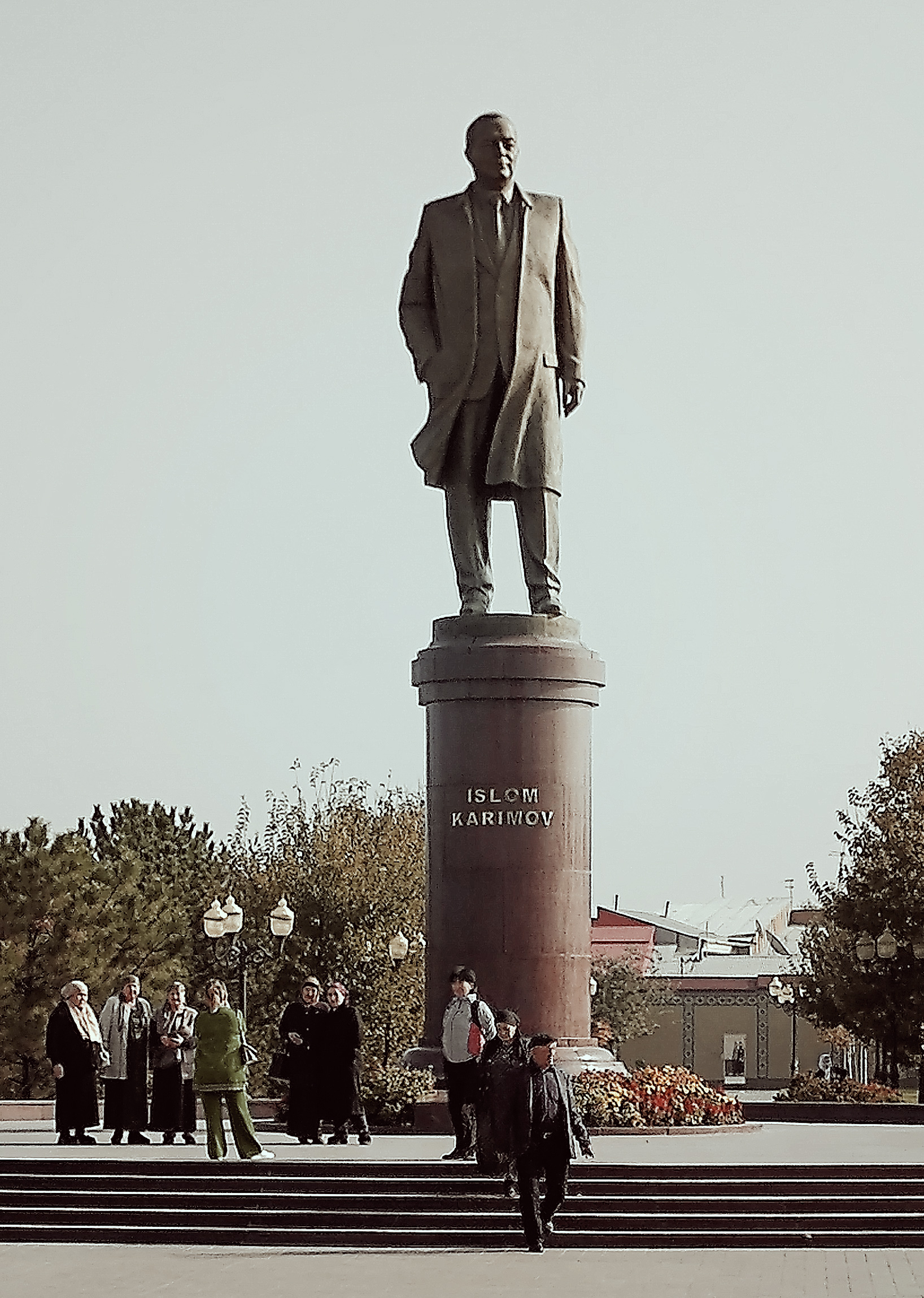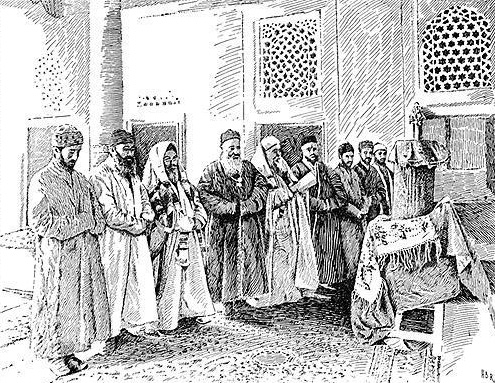|
Islam Karimov
Islam Abduganiyevich Karimov ( uz, Islom Abdugʻaniyevich Karimov / Ислом Абдуғаниевич Каримов, italics=no; russian: link=no, Ислам Абдуганиевич Каримов; 30 January 1938 – 2 September 2016) was the leader of Uzbekistan and its predecessor state, the Uzbek Soviet Socialist Republic, from 1989 until his death in 2016. He was the last First Secretary of the Communist Party of Uzbekistan from 1989 to 1991, when the party was reconstituted as the People's Democratic Party of Uzbekistan (PDP); he led the PDP until 1996. He was the President of the Uzbek SSR from 24 March 1990 until he declared the independence of Uzbekistan on 1 September 1991. He declared Uzbekistan an independent nation on 31 August 1991. He subsequently won a non-democratic presidential election on 29 December 1991, with 86% of the vote. Foreign observers and opposition party cited voting irregularities, alleging state-run propaganda and a falsified vote count. Kari ... [...More Info...] [...Related Items...] OR: [Wikipedia] [Google] [Baidu] |
Hero Of Uzbekistan
Hero of Uzbekistan ( uz, Oʻzbekiston qahramoni, Uzbek alphabet#Correspondence chart, Cyrillic Ўзбекистон қаҳрамони) is the highest national award in the Republic of Uzbekistan. It is awarded to citizens of Uzbekistan and non-citizens for merit to the country. The title "Hero of Uzbekistan" and the medal that comes with it, ''Oltin Yulduz'' ("Gold Star") are awarded by the President of Uzbekistan. The parliament of Uzbekistan first created the law establishing the award on 5 May 1994, and since then more than 50 people have received it. History and creation The title "Hero of Uzbekistan" has its origins in its predecessor title, the Hero of the Soviet Union, which was the highest distinction in the Soviet Union and Uzbek Soviet Socialist Republic from the award's creation on April 16, 1934, until the dissolution of the Soviet Union on December 26, 1991. The Supreme Soviet of the Republic of Uzbekistan, then the country's Oliy Majlis, legislative body, created the ... [...More Info...] [...Related Items...] OR: [Wikipedia] [Google] [Baidu] |
Tatyana Karimova
Tatyana Akbarovna Karimova (russian: Татьяна Акбаровна Каримова) is an Uzbek economist who held the position of First Lady of Uzbekistan from 1991 until the death of her husband in September 2016. The widow of former President Islam Karimov, she was a highly influential figure throughout her husband's rule. Karimova, together with Rustam Inoyatov, the head of the National Security Service, was expected to play a key role in choosing Karimov's successor. Early life and family Born in the harsh years following World War II into a military family, Karimova, who is of Russian and Tajik origin, moved with her parents to the Fergana Region in 1952. Her family has been described as influential. She has a younger sister, Tamara Sobirova. Tatyana worked as a researcher at the Institute of Economics of the Academy of Sciences of Uzbekistan. Biography Islam Karimov was previously married to his first wife, Natalya Petrovna Kuchmi, from 1964 until their divorce dur ... [...More Info...] [...Related Items...] OR: [Wikipedia] [Google] [Baidu] |
Tashkent State Technical University
Tashkent State Technical University (TSTU) ( Uzbek: ''Toshkent Davlat Texnika Universiteti'') is one of the oldest universities of Uzbekistan. Currently, the university consists of 6 faculties, and prepares highly skilled professionals in technical and engineering fields. For this year, it is estimated to run 56 departments with over 10 746 students, who are taught by 6 academicians of the Academy of Sciences of Uzbekistan, 74 doctors of sciences and 314 candidates of sciences. History The history of "Tashkent State Technical University," named after Abu Rayhan Beruni ('’’TSTU'’’), goes back to the Soviet Union times. TSTU is currently one of the oldest educational places in Uzbekistan. Its first establishment date refers to the April 21, 1918. Firstly, the university was established as the small technical faculty of " Turkistan National University", and it worked for the whole Central Asia. That technical faculty saw many changes in its history, but it is the base of cu ... [...More Info...] [...Related Items...] OR: [Wikipedia] [Google] [Baidu] |
Radio Free Europe/Radio Liberty
Radio Free Europe/Radio Liberty (RFE/RL) is a United States government funded organization that broadcasts and reports news, information, and analysis to countries in Eastern Europe, Central Asia, Caucasus, and the Middle East where it says that "the free flow of information is either banned by government authorities or not fully developed". RFE/RL is a private, non-profit 501(c)(3) corporation supervised by the U.S. Agency for Global Media, an independent government agency overseeing all U.S. federal government international broadcasting services. Daisy Sindelar is the vice president and editor-in-chief of RFE. RFE/RL broadcasts in 27 languages to 23 countries. The organization has been headquartered in Prague, Czech Republic, since 1995, and has 21 local bureaus with over 500 core staff and 1,300 stringers and freelancers in countries throughout their broadcast region. In addition, it has 700 employees at its headquarters and corporate office in Washington, D.C. Radio Free E ... [...More Info...] [...Related Items...] OR: [Wikipedia] [Google] [Baidu] |
Bukharan Jews
Bukharan Jews ( Bukharian: יהודיאני בוכארא/яҳудиёни Бухоро, ''Yahudiyoni Bukhoro''; he, יהודי בוכרה, ''Yehudey Bukhara''), in modern times also called Bukharian Jews ( Bukharian: יהודיאני בוכארי/яҳудиёни бухорӣ, ''Yahudiyoni Bukhorī''; he, יהודים בוכרים, ''Yehudim Bukharim''), are an ethnoreligious Jewish sub-group of Central Asia that historically spoke Bukharian, a Judeo-Tajik dialect of the Tajik language, in turn a variety of the Persian language. Their name comes from the former Central Asian Emirate of Bukhara (now primarily Uzbekistan), which once had a sizable Jewish population. Bukharan Jews comprise Persian-speaking Jewry along with the Jews of Iran, Afghanistan, and the Caucasus Mountains. Since the dissolution of the Soviet Union, the great majority have immigrated to Israel or to the United States while others have immigrated to Europe or Australia. Bukharan Jews are Mizrahi Jew ... [...More Info...] [...Related Items...] OR: [Wikipedia] [Google] [Baidu] |
Tajiks
Tajiks ( fa, تاجيک، تاجک, ''Tājīk, Tājek''; tg, Тоҷик) are a Persian-speaking Iranian ethnic group native to Central Asia, living primarily in Afghanistan, Tajikistan, and Uzbekistan. Tajiks are the largest ethnicity in Tajikistan, and the second-largest in Afghanistan and Uzbekistan. They speak varieties of Persian, a Western Iranian language. In Tajikistan, since the 1939 Soviet census, its small Pamiri and Yaghnobi ethnic groups are included as Tajiks. In China, the term is used to refer to its Pamiri ethnic groups, the Tajiks of Xinjiang, who speak the Eastern Iranian Pamiri languages. In Afghanistan, the Pamiris are counted as a separate ethnic group. As a self-designation, the literary New Persian term ''Tajik'', which originally had some previous pejorative usage as a label for eastern Persians or Iranians, has become acceptable during the last several decades, particularly as a result of Soviet administration in Central Asia. Alternative names for t ... [...More Info...] [...Related Items...] OR: [Wikipedia] [Google] [Baidu] |
Uzbeks
The Uzbeks ( uz, , , , ) are a Turkic ethnic group native to the wider Central Asian region, being among the largest Turkic ethnic group in the area. They comprise the majority population of Uzbekistan, next to Kazakh and Karakalpak minorities, and are also found as a minority group in: Afghanistan, Pakistan Tajikistan, Kyrgyzstan, Kazakhstan, Turkmenistan, Russia, and China. Uzbek diaspora communities also exist in Turkey, Saudi Arabia, United States, Ukraine, and other countries. Etymology The origin of the word ''Uzbek'' still remains disputed. One view holds that it is eponymously named after Oghuz Khagan, also known as ''Oghuz Beg'', became the word ''Uzbek''.A. H. Keane, A. Hingston Quiggin, A. C. Haddon, Man: Past and Present, p.312, Cambridge University Press, 2011, Google Books, quoted: "Who take their name from a mythical Uz-beg, Prince Uz (beg in Turki=a chief, or hereditary ruler)." Another theory states that the name means ''independent'', ''genuine man'', or ... [...More Info...] [...Related Items...] OR: [Wikipedia] [Google] [Baidu] |
2015 Uzbek Presidential Election
Presidential elections were held in Uzbekistan on 29 March 2015. The result was a victory for incumbent President Islam Karimov, who received over 90% of the vote. Karimov's win gave him a fourth consecutive term as president, dating back to 1990. Background A constitutional law on presidential elections was approved by the Senate on 23 March 2012,Karimov surreptitiously shortens presidential term of office Uznews, 29 March 2012 which required presidential elections to be held 90 days after parliamentary elections. Elections to the Legislative Chamber were held over two-rounds, the first on 23 December ... [...More Info...] [...Related Items...] OR: [Wikipedia] [Google] [Baidu] |
2007 Uzbek Presidential Election
Presidential elections were held in Uzbekistan on 23 December 2007.Uzbek Incumbent Wins Presidential Poll Without 'Genuine Choice' Radio Free Europe/Radio Liberty, 24 December 2007 Incumbent president was re-elected with 91% of the vote. Background According to the , incumbent President 's term was cons ...[...More Info...] [...Related Items...] OR: [Wikipedia] [Google] [Baidu] |
2000 Uzbek Presidential Election
Presidential elections were held in Uzbekistan on 9 January 2000. The result was a victory for incumbent Islam Karimov, who won 95.7% of the vote. Turnout was reported to be 95.1%. Two candidates participated in the elections; Islam Karimov, the incumbent president and Abdulkhafiz Jalolov, the First Secretary of the largest party in the country, the People's Democratic Party of Uzbekistan (XDP). While Jalolov was nominated by the XDP, Karimov was surprisingly nominated by a new party, the Self-Sacrifice National Democratic Party (FMDP). Many outside observers stated that Karimov was actually in control of these two parties, and Jalolov was only allowed to run as a candidate to give an illusion of democratic election. The elections were not democratic. Jalolov, a former Marxist historian and ideologist from the defunct Communist Party of Uzbekistan, was little known to voters, compared to Karimov. The two candidates' programmes were described by Radio Free Europe/Radio Liberty as h ... [...More Info...] [...Related Items...] OR: [Wikipedia] [Google] [Baidu] |
1995 Uzbek Presidential Term Referendum
A referendum on extending President Islam Karimov's term was held in Uzbekistan on 26 March 1995. The proposal would see Karimov remain in office until 2000. It was approved by 99.6% of voters, with a 99.3% turnout. The referendum was held a few months before Karimov's current term was due to expire, as he had been elected in December 1991. Conduct The United States criticized the referendum for its "lack of public debate", and noted several cases where one person cast votes for their entire family. At the time, Karimov publicly stated that he considered the referendum to be the equivalent of re-election for a second term, which under the Constitution would have required him to leave office in 2000. However, the legislature passed a resolution opposing the decision, leading Karimov to announce he would run for re-election in 2000. [...More Info...] [...Related Items...] OR: [Wikipedia] [Google] [Baidu] |
1991 Uzbek Presidential Election
Direct presidential elections were held for the first time in Uzbekistan on 29 December 1991. Their result was a victory for Islam Karimov of the People's Democratic Party of Uzbekistan, who won with 87.1% of the vote. Voter turnout was reported to be 94.2%. The elections were held alongside an independence referendum. The elections were the only presidential elections in Uzbekistan to date to feature a genuine opposition candidate. Every election since has been considered to feature only token opposition candidates. Karimov later ruled until his death in 2016. Background Karimov had been elected the first President of the Uzbek SSR by the Supreme Soviet on 24 March 1990, with 491 votes in favour and 7 against. Candidates Initially several prominent figures were interested in running. Besides Karimov and Muhammad Salih, a prominent opposition leader, Abdurakhim Pulatov from Unity and Abdullah Utayev, leader of Islamic Renaissance Party of Uzbekistan, both declared their candi ... [...More Info...] [...Related Items...] OR: [Wikipedia] [Google] [Baidu] |






.jpg)